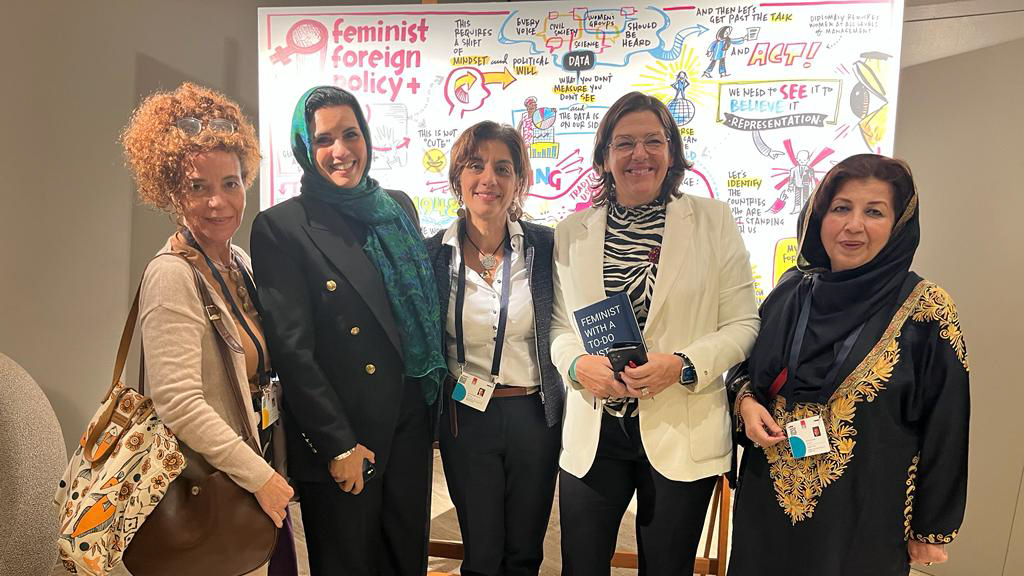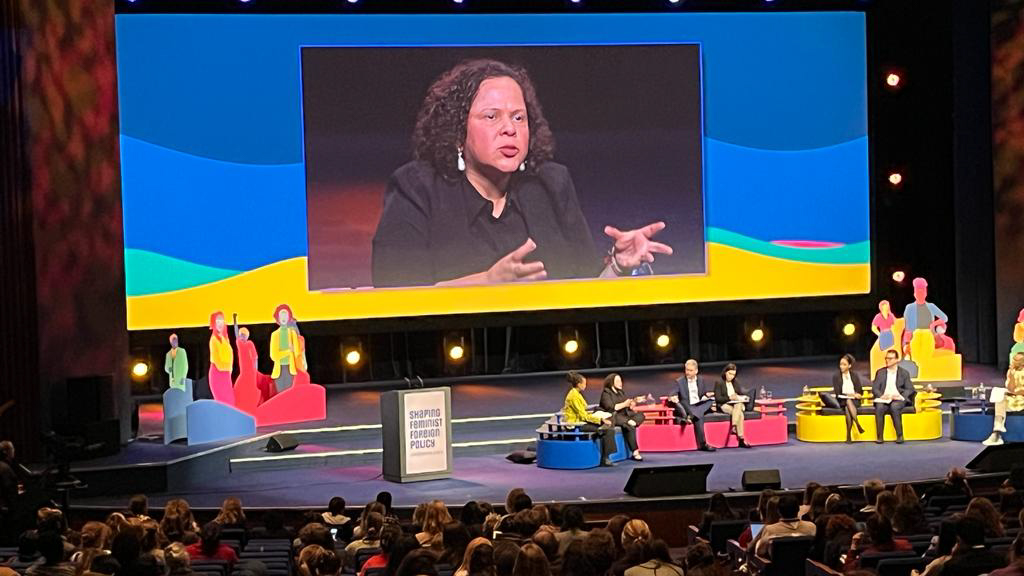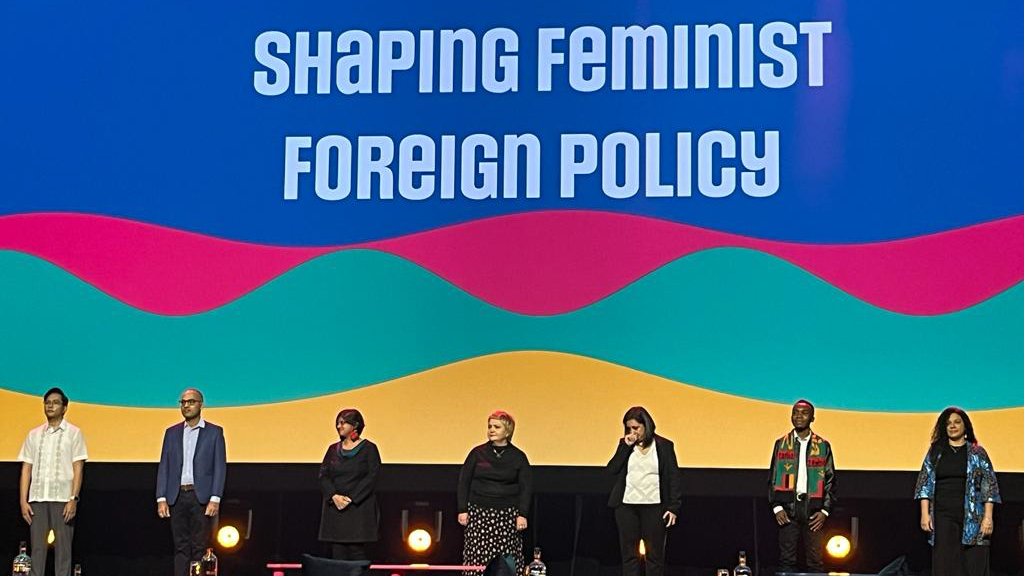Five takeaways from the Shaping Feminist Foreign Policy Conference in The Hague by Thania Paffenholz
Inclusive Peace’s ED, Thania Paffenholz, here reflects on her recent participation in the Shaping Feminist Foreign Policy 2023 Conference in The Hague.
After an intense WPS week in New York, I arrived exhausted in The Hague ahead of the Shaping Feminist Foreign Policy 2023 Conference. However, I eventually left the city energized by all the wonderful encounters with friends and colleagues and the rich and critical discussions before, during and after the conference. In this blog I reflect on the conference as such and share my observations emerging from the formal and informal discussion and debates at the conference.
In short my five takeaways are:
-
-
-
-
- The conference was excellently organised with a diverse participant group and a conference organization that allowed for critical debate
- There is a gap between a gender-inclusive and gender-transformative FFP
- Gender budgeting and making funding mechanisms fit for purpose is central
- The tension between FFP and militarisation was not sufficiently addressed
- FFP seems to be a useful label
-
-
-
# 1: Diverse participant group and a conference organization that allowed for critical debates
The organisers, The Dutch Ministry of Foreign Affairs, brought together a wonderful diverse group of people from all around the globe and they organised the conference in a way that placed activists from challenging contexts at the centre of the event. The organisers also resisted to only showcase successes or to repeat simplified complaints on why women are not included in various processes. Instead, we saw honest exchanges with very practical reflections on next steps to address the existing gaps in FFP and we saw honesty about stark realities. One of them being that dismantling patriarchy is a major objective for a FFP, but that it is not realistic that this will be achieved easily.
Connecting and reconnecting with the many activists, experts and supporters was simply wonderful. Prior to the conference, the Dutch WPS and Feminist INGOs organized a Feminist Community Festival that allowed for more informal exchanges, practical conversations which prepared us participants well for the conference.
# 2: The gap between a gender-inclusive and gender-transformative FFP
FFP is at the very beginning in trying to implement more gender-inclusive programming but still must come a long way before being truly gender-transformative. While specific funds mostly focused on support to local women organisations in the Global South have been set up for gender inclusion, donors are also asking themselves how to move beyond and address power asymmetries through programming. This might work in specific cases, however, there are many obstacles such as incoherent programme budget lines; lack of joint country or regional planning in sector protective aid programmes; tensions between development , trade and diplomacy, and the challenge that most big funds go to humanitarian aid that is less open for transformative approaches.
The gap between a gender-inclusive and gender transformative FFP is also related to a lack of progress on the localisation agenda. This particularly means a lack of an explicit feminist localisation agenda that openly discusses not only funding mechanisms but also who distributes the funds, who employs whom for what in the aid industry and how these post-colonial power imbalances can be addressed as part of a broader inclusive FFP. Philanthropy donors seem to be a step further ahead as some give either high overheads or non earmarked institutional funding with less bureaucratic hurdles and explicitly focus on support to feminist movements.

# 3: Gender budgeting and making funding mechanisms fit for purpose is central
Many debates at the conference focussed on funding mechanisms as a precondition for changed programming and enabling support to feminist movements. This is a good start and we heard interesting examples from smaller and bigger donors like development banks, new modalities such as the Women Peace and Humanitarian Fund that brings INGOs and local organisations into partnerships and should allow for quicker and more flexible disbursement and donor funds that include Southern actors in a some decision making bodies. However, activists criticised the funding mechanisms of being still far too colonial with upwards accountability persisting and overburdensome administrative hurdles that make the dependency on the INGO intermediaries here to stay and discourage equal partnerships between Global South and Global North.
#4: The tension between FFP and militarisation was not sufficiently addressed
Government representatives at the conference were challenged throughout by activists that vividly pointed to the tension between the anti-militarised FFP normative frames and current practices. The call for a humanitarian ceasefire between Israel and Hamas dominated the scene culminating in a walk out of many activists during the speech of Hugh Adsett, Ambassador of Canada to the Netherlands and Permanent Representative to the OPCW (Canada voted against a ceasefire resolution) as well in shouting at the Dutch Minister of Foreign Affairs, Hanke Bruins Slot, during the closing ceremony (The Netherlands had obtained the resolution). These current debates need more space in the future and should be moved from these expressions of frustration and informal conversations to public debates on how to deal with these tensions and ultimately overcome them.
.
# 5: FFP seems to be a useful label
My last takeaway is more of a question of whether FFP is a useful label. The case of Sweden is telling here: With the change in government last year, the new government instantly abolished the label and made substantial financial cuts for civil society, peace and development policies and programming with the result that the entire sector is suffering from these financial cuts. Nevertheless, gender equality is enshrined in the Swedish constitution and the years of FFP in Sweden have not only inspired other countries, but have shown how to more effectively practise inclusive policies and programming. This was echoed by government representatives of countries like Germany, Mexico or the Netherlands who find themselves in more vivid, concrete and results-oriented discussions in their respective ministries about how to implement gender-transformative policies which creates a more conducive environment for civil society action.

I am grateful to have been a part of these rich discussions and I look forward to the Shaping Feminist Foreign Policy Conference 2024 in Mexico.

